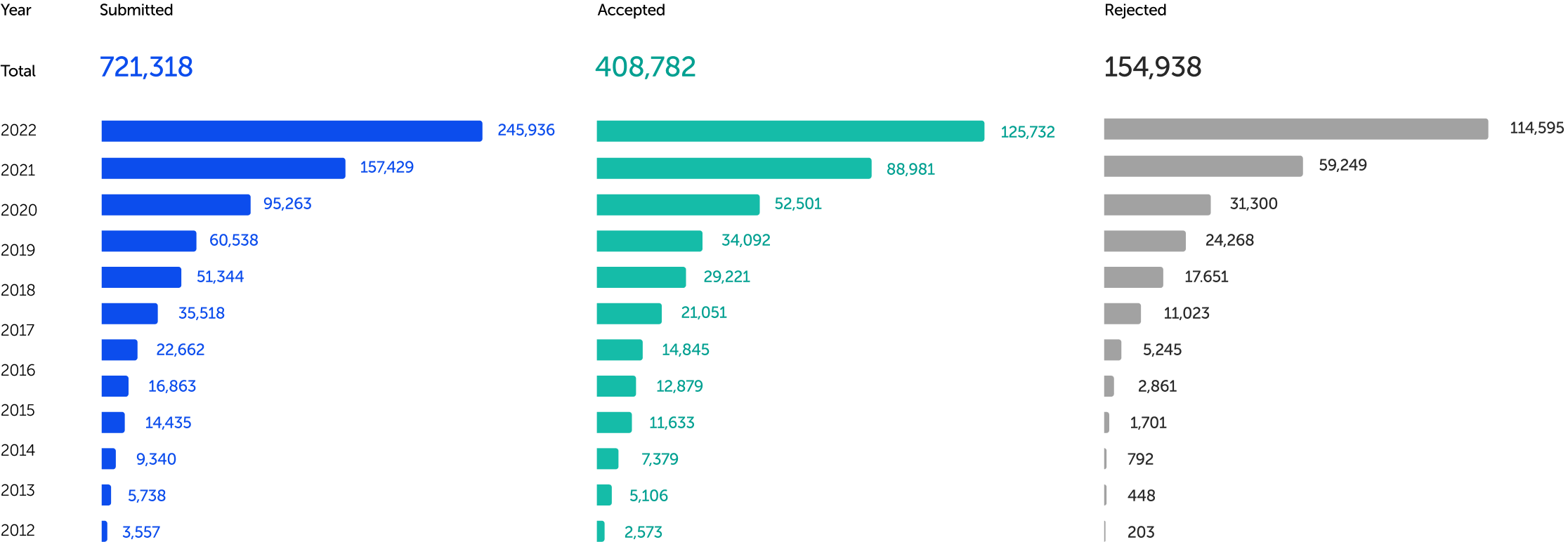Speed
We’re on an important mission and speed is essential – that’s why we work efficiently and decisively to achieve results.
The importance of speed
Providing immediate, free access to vital research is core to our mission

The record-breaking development of vaccines and treatments for COVID-19 demonstrated the power of open science. Solutions that have saved lives and helped most of the world’s population return to pre-pandemic activities were only accomplished thanks to the rapid sharing of scientific articles.
Rapid sharing in action
In January 2020, before most of us had heard of SARS-COV-2, Chinese scientists shared the genetic sequence openly. A German scientist and CEO of BioNTech, Ugur Sahin, accessed the genetic sequence of the virus and quickly shared it with his colleagues.
On 25 January, Sahin and his research partner, Ozlem Tureci, committed to making a vaccine using the shared data - and by 26 January they had already designed eight potential vaccine candidates and sketched the technical construction plans for them.
These actions accelerated all research around COVID-19 and delivered vaccines and treatments at a speed never seen before. Based on what we, collectively, learned from the pandemic, the US White House and a coalition of research organizations launched the COVID-19 Open Research Dataset (CORD-19) in March 2020, making all related research openly available to people and machines.
What this means for Frontiers
Speed is of the essence. The scientific and research community is working against the clock to find solutions for humanity’s biggest, most pressing challenges.
As a scientific publisher we play our part by offering the most efficient service we can. We’re committed supporting researchers to get their important discoveries into the world as soon as possible.
Why rapid open access matters
“The determination and collaboration we saw for COVID-19 must now be urgently replicated across other areas of science. Disseminating quality scientific research quickly and openly is key to enabling progress, and this is where publishers have a role to play.”
Kamila Markram
CEO and co-founder, Frontiers
Peer review
We offer one of the most efficient systems among academic publishers

Your research is published faster
We know you want to publish your research quickly, so that other researchers can access, read, and start to build on your work.
Frontiers’ publishing platform is custom-built to be fast, efficient, thorough, and to provide a great experience.
Our collaborative review forum guides authors, reviewers, and editors smoothly through the review process and alerts them when any action is required.
This, along with a focus on process optimisation, has resulted in an average time from submission to decision of 48 days in 2022, down from 61 days in 2021. Average review time is calculated as the median time across all manuscripts peer reviewed across the year.
Revolutionizing how high-quality research
is published
With the latest custom-built technology and artificial intelligence, we’re pushing boundaries to create a faster, more efficient peer review.
Our artificial intelligence review assistant (AIRA) was an industry-first, and it means we can balance the need for speed with our unwavering focus on high quality.
AIRA supports our reviewers and editors by making automated quality checks - from assessing language accuracy and the integrity of figures, to detecting plagiarism and conflicts of interest.
“The Frontiers team works tirelessly with editors to streamline the article management process, using state-of-the-art AI tools and information portals to fast-track the editing, review and decision-making process.”
Matthew McCabe
Specialty Chief Editor, Frontiers in Artificial Intelligence
Did you know?
Our artificial intelligence assistant can now make up to 20 quality checks in just a few seconds.
85% of all participants rate our peer review experience as excellent or good
Our peer review platform was built in-house and is under continual development - so we can be sure it responds to your needs.
In 2022 we asked 126,506 accepted authors, handling editors and reviewers how they would rate their recent experience of our peer review process.
Submissions, acceptances, and rejections
Our peer review is designed to be thorough and efficient, so you receive a fair decision on your manuscript as soon as possible.
In 2022 the rejection rate for articles was on average 40% across all Frontiers journals, and as high as 79% in some journals.







